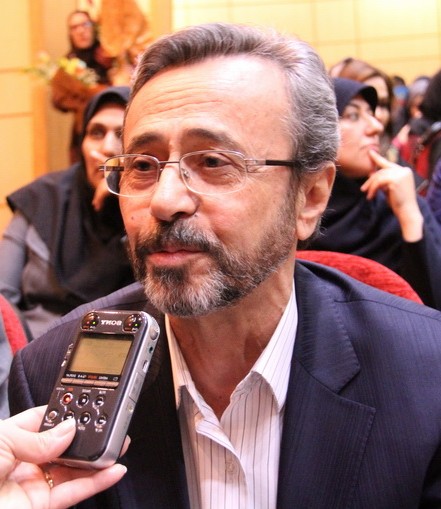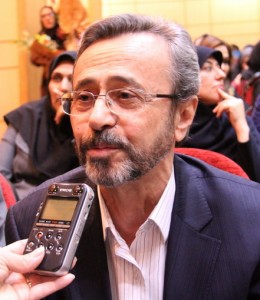From Traditional to Modern Pharmacy

Medicinal plants and herbal medicine together are one vast chain, which start with the cultivation and collection of plants from different regions, and continue to several other procedures such as harvesting, storage and warehousing, pharmacy, food products, cosmetic and hygienic products, veterinary drugs, etc.
Introduction
Dr. Gholamreza Amin is a professor of Tehran University of Medical Sciences, Faculty of Pharmacy. He was born in Bandar Torkaman of Golestan province in 1945, after receiving his bachelor’s degree in natural resources engineering and master’s in botany, he continued in pharmacognosy. Dr. Amin has already had so many different responsibilities, some of which are as follows: head of department of Traditional Pharmacy in Faculty of Traditional Medicine of Tehran University of Medical Sciences, head of Herbarium and Herboratum of Tehran University of Medical Sciences Faculty of Pharmacy, member of founders and the research council of Persian Medicine and Pharmacy Research Center, member of Medicinal Plants Branch of Traditional Medicine Department of Academy of Medical Sciences, etc, all of which are indications of this professor’s noteworthy experiences in the field of medicinal plants and traditional medicine.
Greetings to you, as a specialist and experienced person in the science of medicinal plants, kindly, tell us your general outlook on this subject and traditional medicine in Iran.
Several factors such as, Iran’s rich natural flora, and as a result, its abundance and variety of valuable medicinal plants, on one hand, and its cherished background in traditional medicine and scientific sources, on the other, and more importantly, people’s traditional beliefs, have all contributed to promote the short term, medium term and long term goals of public health care and treatment of some diseases. Once these capabilities are re-recognized, and a consistent tie is formed among them, a secure and confident path is paved to gain social health care provision.
Do you think that Iran’s medical society today, has come to understand the importance of medicinal plants and herbal medicines?
The professional knowledge of the world’s different medical fields is determined by the empirical methods of medical education. Therefore, if we notice the reference system of medical fields, we can easily see the application of the presented knowledge. At the moment, if there are any deficiencies in scientific and applied data, it is due to drawbacks in medical educational system of Iran, which have recently been attended to and planned for. We will soon witness an impressive change when traditional medicine faculties in most of our country’s universities are established.
In your opinion, how can medical prejudices and biases be eradicated and medicinal plants and herbal medicine be entered in our medical system?
I believe, there are no prejudices, since the world’s most fundamental drugs have plant origins and you cannot find a single person in the medical fields to be able to even imagine a substitute for morphine, digoxine, etc. The difference of opinion is in claims without defendable clinical trials. As mentioned before, if the education and research in this field is carried out in accordance with the acceptable international patterns, a completely scientific system of data is formed and medicinal products are distributed according to international standards, you may not find anyone to use them more eagerly than the medical society.
As a professor of pharmacognosy, do you think the syllabi for general pharmacology and those of pharmacognosy meet your expectations, and that these syllabi can satisfy the country’s needs for trained specialists in medicinal plants?
From one point of view it’s not enought, but from another, since there are a lot of courses in pharmacy, there is no more time for further courses, also there is a technical training course for university and research centers. The only solution to satisfy the immediate needs of the current situation is the short term programs which lead to professional degrees for employment. However, for long term, different sub disciplines of fields of study and introduction of new courses are required.
Apart from the pharmacology and pharmacognosy, we now have traditional pharmacy, how do you evaluate this new field of study that has recently been introduced to the country?
The introduction of this technical field, which took place in faculties of traditional medicine, has been a remarkable innovation. This was coincidental with traditional medicine education to general practitioners and traditional pharmacy education to general pharmacists. In fact, this innovation was designed to use pharmaceutical methods with the information from the traditional medicine but with the help of the latest improvements in modern pharmacy. The graduates of this major, not only help provide the universities and research centers with specialists, but can work side by side with traditional medicine specialists in health care centers and villages, which will hopefully be open for the first time in Iran.
You have written a book entitled, “The Most Common Traditional Iranian Medicinal Plants”, which is somehow the first book of its kind to have scientifically addressed, the traditional medicinal plants that are sold in herb stores. What made you decide there’s a need for this book?
A long time ago, when I witnessed considerable differences of opinion in this field, I decided to compile a book that signifies these specimens with their scientific names and that could be benefited in both basic and applied researches. This research took 12 years to accomplish, I collected a lot of specimens by traveling to so many different provinces and by approaching a lot of wholesalers of medicinal plant specimens, then I named them by herbarium study methods, and with the help of laboratory tools and equipment as well as the pictures that I had taken myself. I tried to choose those specimens that are more common in Iran and those sold in most medicinal plant stores. Applicability and the speed, with which you could use this book especially in pharmacies, were among my priorities when compiling it. At the moment, I am revising and completing the book and will soon hand it to the university’s publication department.
Do you think that there is still a need for identification and introduction of traditional Iranian medicinal plants?
There are of course, some other more species that are used in different parts of Iran and some in only specific regions, whose identification is required. However, they are not common all over Iran, hence not included in this book.
There is the important subject of adulteration and mistakes in medicinal plants, how can this problem be solved?
There’s no other way but to identify them scientifically in reliable university and research centers which have herbarium and experienced researchers, so that these plants are not sold in bulk but sold in packages sealed with national or international standards.
Could you please give some examples of these adulterations and mistakes?
Among the common plants we can name thymes and a variety of alceas.
In the end if there’s anything you would like to add, please do so.
Medicinal plants and herbal medicines together are one vast chain, which start with seed, sapling and suitable land preparation for the cultivation or collection of plants from different regions, and continue with several other procedures such as post-harvest processes, packaging and storage, pharmacy, food products, cosmetic and hygienic materials, veterinary drugs, etc. With each of these procedures comes a world of entrepreneurship and revenue, and its main privilege is self-sufficiency and production by standing on our own feet. The key to the optimal use of this valuable combination is a management to join the different rings of this chain together. This must be dealt with sooner rather than later. It is absolutely necessary to educate some experts who are capable of advancing this enormous chain.
- Comments submitted by you will be published by administrators after approval.
- Comments that contain mohareb or worse will not be published.
- Comments that will not be published other than English or non-English.


Send Comment
Total comments : 0 Pending review : 0 Published : 0